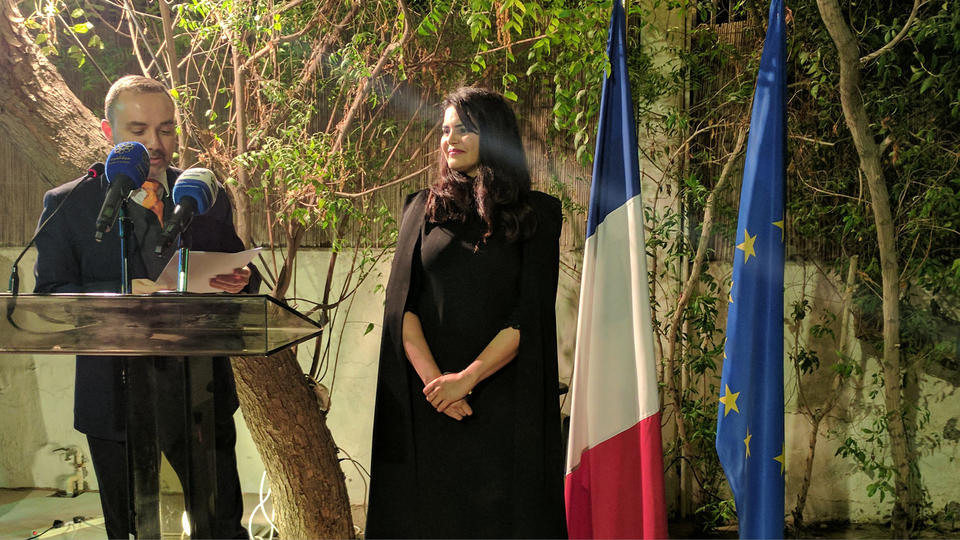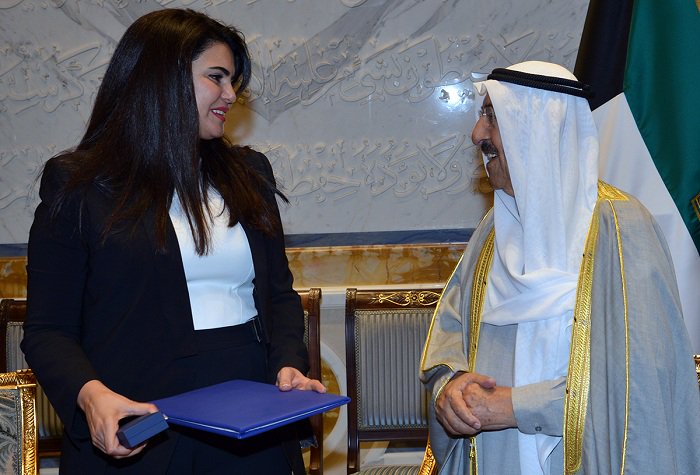
WASHINGTON DC –In a conservative region where lobbying for women’s rights has its social and cultural challenges, Kuwaiti women’s advocate Dr. Al-Sharekh last month was recognized by the BBC as one of the top 100 influential women around the world for 2019, and is the first Kuwaiti female to be received on the list. Women in the Arab World have always played a significant role in both private and public spheres, however today, we are seeing women increasingly in the frontlines.
Dr. Al Anoud Al-Sharekh has been actively working and investigating ways to level-the playing field for women in Kuwait and in effect the greater Middle East, through her work in academia on women, youth, and security, on local legislation, and strategic advisory where she is Consulting Partner at Ibtikar. Dr. Al-Sharekh is a leading figure in encouraging female empowerment, and has successfully established partnerships and initiatives with her Government and global organizations dealing with women issues.
Dr. Al-Sharekh has been able to make great gains for women in the region in her work, and has won the support of Kuwait’s forward-looking leadership. On October 24, 2019 His Highness the Emir of Kuwait Sheikh Sabah Al-Ahmad Al-Jaber Al-Sabah congratulated the BBC achievement in a cable to her, as well as commended by Speaker of the Kuwaiti National Assembly Marzouq Ali Al-Ghanim where he highlighted such recognition is a reflection of efforts of Kuwaiti women both regionally and internationally. She is most inspiring, and an testament that an issue raised intellectually and thoughtfully –lobbied for in the appropriate channel –can create positive change.
This is not the first time Dr. Al-Sharekh’s work has been internationally recognized. In 2016 Dr. Al-Sharekh was awarded the French National Order of Merit. The membership is bestowed by the President of the French Republic for a person’s civil achievements, which was in homage to her work not only in Kuwait but the dialogue and efforts she participates in around the world.
“An issue raised intellectually and thoughtfully –lobbied for in the appropriate channel –can create positive change.”
Elzeini

I first met Dr. Al-Sharekh several years ago in Princeton University attending a conference at the Woodrow Wilson School of Public and International Affairs. Since then, she has become a dear friend to me and a woman who I’m inspired by, finding myself constantly following her work. Her journey in gender equality and policy was not traditional, and certainly not always easy, but her deep passion for bettering the life of the community around her — deeply routed in a sense of patriotism –has allowed her to stay her course leading to great achievements in the region. This week I spoke to her on her journey in gender equality, regional insights and challenges:
Through your work in women’s issues, how have you seen the gender equality movement evolve?
When I was younger and still denied the right to vote some MPs made public their views on women’s participation in Kuwaiti politics. Those views were mostly catastrophic and deeply offensive. I was of the last generation that had to suffer through that and now my daughter’s generation gets to fight for equality from a better starting point. However, across the globe I see the gender equality go through ebbs and flows. There are constant threats and setbacks so we must always remain vigilant.
I think gender equality is just one form of equality that we need to look at. We need to look at finding equal opportunities for young people if young people or women from a certain socioeconomic background are only allowed to engage in the labor market in entry level positions this is going to create huge problems for us in the future, because the aspirational underpinnings of any education or any form of ambition is upward social and economic mobility and if there is a ceiling on that then you have frustration, anti-establishment movements, and economic and cultural regression. Yes, I strongly believe in gender equality in terms of legal rights and in terms of opportunities, but I also believe in the need to investigate ways to make it a level-playing field for people from different socioeconomic backgrounds and especially for young people.
“Across the globe I see the gender equality go through ebbs and flows. There are constant threats and setbacks so we must always remain vigilant.”
Al-Sharekh
When you visit the United States, what are some of the challenges that you find are mutually faced in the West as they are in the East?
Women still get paid less and have unequal access to opportunities. There is a lot of resistance to women in leadership positions and shaming of those who want to pursue both motherhood and a career. Women are still subjected to harassment and violence and not enough is being done to prevent it.
When promoting gender equality are there different challenges you have noticed depending on the region of the world?
The most frustrating aspect of working in a conservative country like Kuwait is that people equate traditions with religion and project that on gender roles in a manner that is convenient to them. Silencing voices of dissent with absolutist arguments is a repetitive strain on gender advocacy whether you are lobbying for curriculum reform, increased visibility for females in leadership positions, or putting an end to violent legislation. In the west sexism can be more insidious and more difficult to name. It can be masked by genteel exteriors that harbor deep resistance to real and lasting change. I’ve had an interesting career where I’ve worked at different times governmental institutions and non-governmental institutions in the Arab world and abroad, and it’s interesting that feminism and its counterpart sexism know no cultural barriers. I’ve actually had to struggle sometimes more being an Arab woman in a non-Arab organization than being an Arab woman back home, because there you have an added layer of racism alongside the sexism. I think that’s the encounter that has astounded me more.
“..People equate traditions with religion and project that on gender roles in a manner that is convenient to them.”
Al-Sharekh
At which point in your career did you face the most resistance? Do you still face those same challenges today?
The most resistance I faced was in making what some deemed “unconventional’ choices. I wanted to study feminism for my PhD and not Elizabethan poetry so I was denied a scholarship. I went into security and regional politics instead of remaining in academia. I have been an activist throughout my many careers. Sometimes it is difficult for people to accept that you do not fit into a previously assigned box and that can happen to both men and women.
What kind of challenges does the government have when the pace of society –the youth’s lack of reverence for traditions – are moving greater than the pace of change. How does one balance security with freedoms?
It is a delicate tight rope especially with the onset of new technologies, social media and many platforms of communication. Legislation is no longer able to be the head of the curve so governments are needing to be agile, creative and constantly improvise.
Look at what the UAE has done, it might be a symbolic gesture having a minister of youth but it’s an important symbolic gesture. I wrote a short article a few years ago warning of an irreversible disconnect between GCC leadership and their youngsters if they don’t actively try to engage them more and I think communicating and being accessible digital media is one way for leaders to get automatic feedback from young people instead of through voice-boxes that claim to speak on behalf of them.
Your work has been in both academia and practice. In what way has academia worked in hand with government? As often there is disconnect between the two worlds.
Academia can be free from practical and urgent application which tethers most of the administrative work of governments. In this way it can provide alternative solutions and approaches or dissect a current problem in a deeper or a cross- disciplinary manner that can benefit governments greatly.
What could Government learn from Academia, and Academia better understand from Government?
Government can learn from Academia the discipline of deep thought and multiple approaches. Academia can better understand that people need practical solutions based on compromises and real needs not classroom conditions.
Government can learn from Academia the discipline of deep thought and multiple approaches.
Al-Sharekh


